The working visit to the United States of America opened up new prospects for professional collaboration and consolidation of moldovan american friendship relations
- 1492 просмотра
- Silvia Ciubrei: Dear Mr. Rector, between January 18 - February 3, 2023, you undertook a trip to the United States of America, together with six other colleagues from Nicolae Testemitanu University. The study visit was organized as part of the Open World Federal Program of the United States of America, funded by the US Library of Congress. This was your first working visit to the USA as rector and, in this context, could you please expand on the results of this academic mobility on the American continent.
According to the agenda, the first destination was the city of Washington. Tell us please about your agenda.
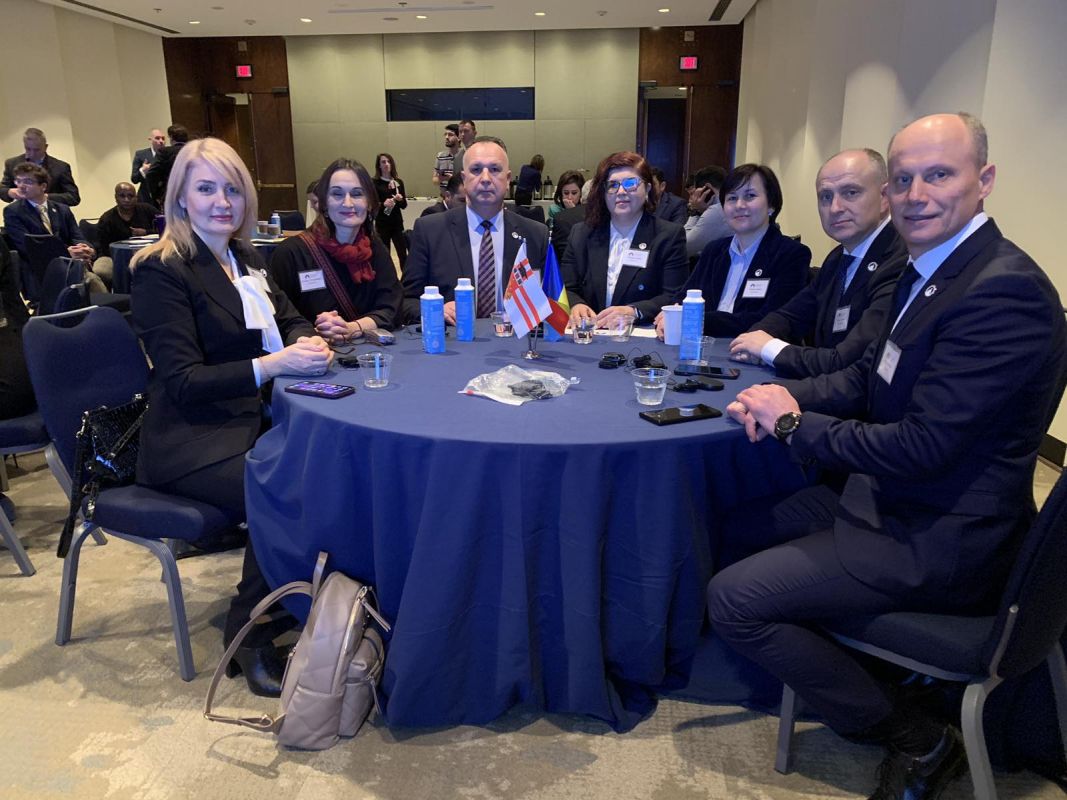
Rector Emil Ceban: Yes, the first destination was Washington, where we spent the first two days. At the Library of Congress, I had a meeting with Jane Sargus, executive director of the Congressional Office for International Leadership, and other meetings with several professors and senators. Some of them delivered lectures about democracy, about the functioning of the USA as a state, its rights, directions, and education. In total, there were four delegations: from the Republic of Moldova, Ukraine, Azerbaijan, and Poland. In the evening we went sightseeing, we saw the White House, the Capitol ...
Did you have the opportunity to meet with the Ambassador of the Republic of Moldova in the United States?
Yes, we were honored to have a meeting with His Excellency Mr. Viorel Ursu, the ambassador of our country, who expressed his surprise at the scope of the University's partnership with North Carolina, the directions of cooperation and, above all, at the fact that American citizens are studying at our university.
We know that your first visit was to the state of North Carolina, with which our country has a sustainable partnership, initiated in 1999.
Indeed, this year, the bilateral partnership between the Republic of Moldova and North Carolina marks its 23rd anniversary. In the capital, the city of Raleigh, we participated in an extensive program, organized under the auspices of the Secretary of State of North Carolina Elaine F. Marshall. The first meeting took place at the Office of the NC Secretary of State, Mrs. Marshall, who is also the Chair of the Bilateral Partnership. This meeting was attended by: Mr. Rodney Maddox, Chief Deputy Secretary of State, all the deputies in different fields, most of them being well-known people, who visited Moldova countless times and worked under the Moldovan American cooperation project, such as Mrs. Lora Sinigur - the contact person, who had a special contribution in the development of our collaboration.
We discussed the achievements in the four areas of collaboration between Nicolae Testemitanu University and institutions from North Carolina: dentistry, pharmacy, nursing and interlibrary partnership. Successful projects with social impact were presented, as well as new aspects of cooperation development.
You had a panel discussion with representatives from the North Carolina Boards of Health. What role do these structures play in the health system?
The second meeting held at the Secretary of State Marshall's Office was with the leadership of all North Carolina State Boards of Health: Medicine, Pharmacy, Dentistry, Nursing and Nutrition. These councils operate independently, people are elected according to the principle of integrity, and cannot have conflicts of interest or resort to influence peddling, their activity being very transparent. The health boards grant a license to each specialist - doctor, pharmacist, dentist..., to each medical institution, pharmacy, dental office, etc. These structures develop and approve standards, monitor and ensure quality control in the health field.
Later you visited the North Carolina University Library and the Hunt Library, which is considered one of the most modern and technologically advanced libraries in the world.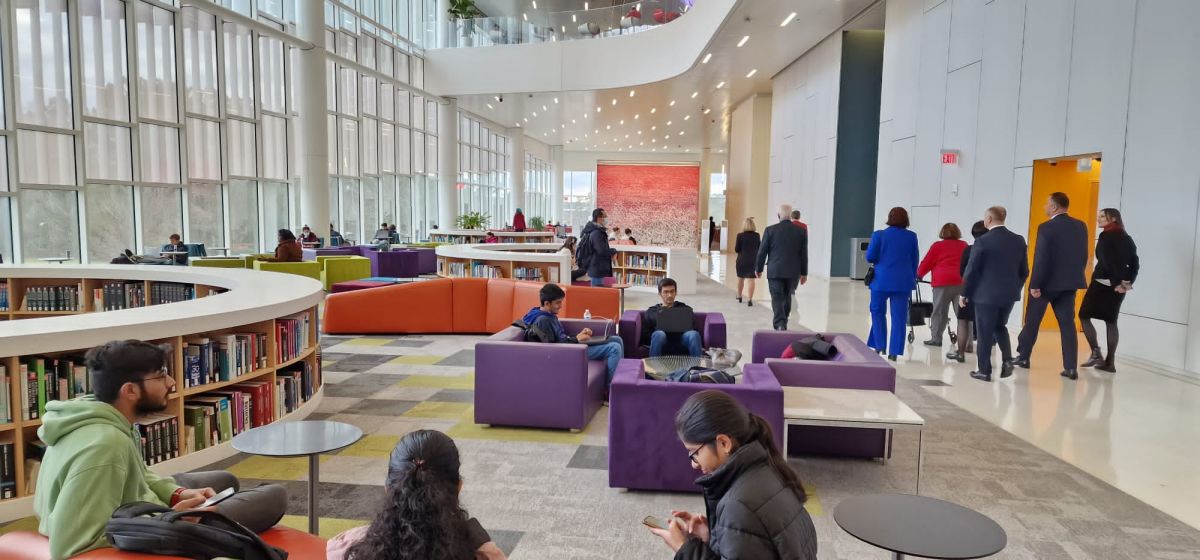
It is. We toured all the reading rooms and the technological ones, we were impressed by the individual workplaces and the group work rooms, the rest areas, the cafe, we talked with beneficiaries, with students. The library operates non-stop and has only one day off – Saturday, otherwise it works 24/24. Here I had a meeting with Donna Flake, coordinator of the partnership between the Health Sciences Library and the 12 medical libraries from North Carolina, and with other librarians involved in the cooperation with the libraries of the Republic of Moldova.
We know that the NC State Secretary's Office organized a welcome reception for our university delegation.Yes, it was a surprise for us.
Yes, it was a surprise for us. At his reception was attended by over 100 guests, including: Deborah Ross, National Guard Commander Marvin T. Hunt, members of the American side of the Republic of Moldova - North Carolina Bilateral Cooperation Committee, heads of health boards, people from the diaspora, doctors of various specialties, representatives of the Rotary Club, people who previously worked at the US Embassy in Chisinau, American soldiers who were on mission in our country. The representatives of the partner universities and the host families from the cities of Chapel Hill, Greensboro were also invited... It was a very heartwarming meeting in a special location - the Raleigh Museum. At the entrance they set up a mini-exhibition about the Republic of Moldova with the flag of our country, souvenirs and gifts received from the Republic of Moldova. I was impressed to learn that the diaspora in Raleigh numbers about 5,000 people. The reception was moderated by Secretary of State Elaine Marshall. I had the honor to convey thanks and a message of gratitude to the American partners, and to the people who made a major contribution, I presented the University Medal "75 years of Quality, Excellence and Performance". I assured them that we are open to strengthening partnerships and expanding the directions of bilateral cooperation.
Your next visit was to one of our partner institutions – the University of North Carolina at Chapel Hill.
Yes, I had a full day there too. First, I toured the university campus, visited the Medical Center. I also visited the Eshelman School of Pharmacy, where I met with Stephen Eckel, Associate Dean of Global Engagement, and Sarah Merritt, Global Education Program Coordinator. We met with the staff members, with the people who were directly involved in the development of our partnership in the pharmacy field. We discussed the prospects for the development of bilateral cooperation, the improvement of educational plans, the possibilities of organizing academic mobility of students and teachers, practical internships, as well as the experience of evaluating the initial skills of study candidates. We also talked about the Scientific-Practical Center in the field of Medicinal Plants in Bardar commune, which serves as a basis for organizing summer practice for students. The American side was interested to learn more about these activities.
Have you visited the scientific laboratories of the Eshelman School of Pharmacy?
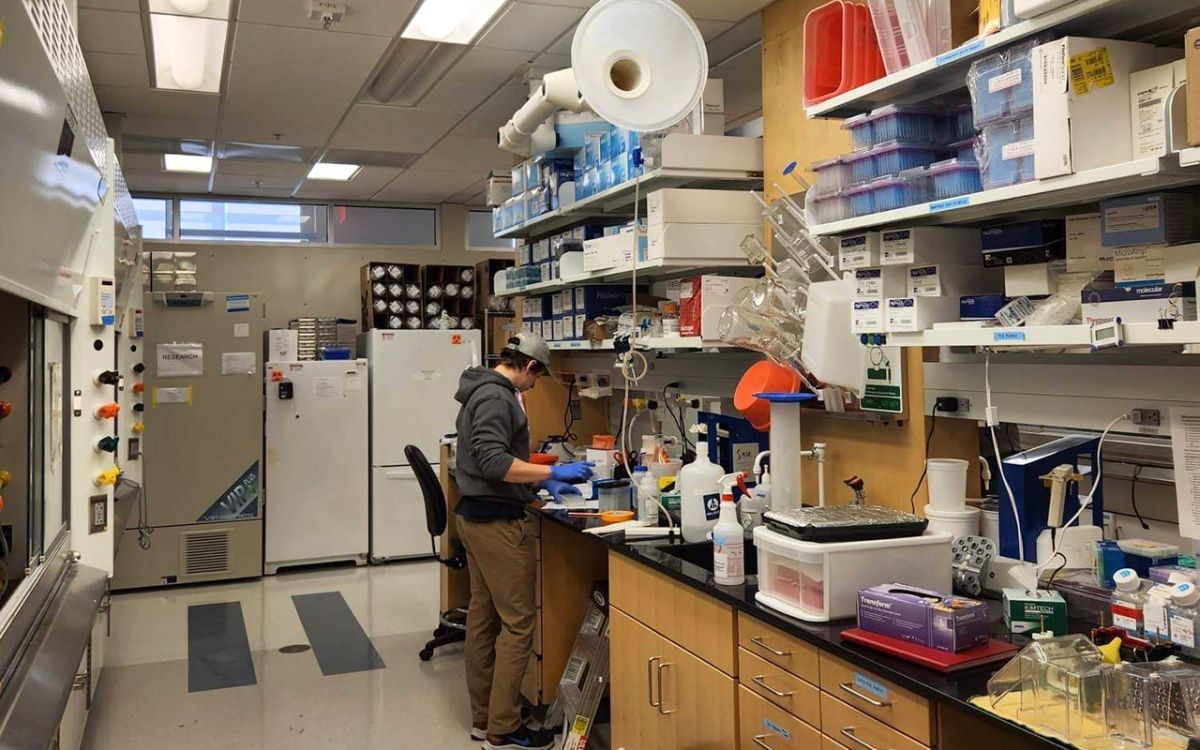
Yes, we also had the opportunity to see the research labs. We were struck by everything we saw there. The research laboratories located in 4-5 floor blocks are endowed with state-of-the-art equipment. These are modern laboratories of international level, where famous personalities from all over the world work for the development of pharmaceutical sciences. The School of Pharmacy itself deals with research, in order to develop and create new medicines. All faculty members, scientific and didactic staff are divided into three categories: those who teach, those who do research and those who combine both activities. This allows them to attract investments - external sources for the development of the School of Pharmacy, especially since they work with companies - world leaders - that produce medicines and vaccines.
Have you also visited the Adams School of Dentistry at the University of North Carolina at Chapel Hill?
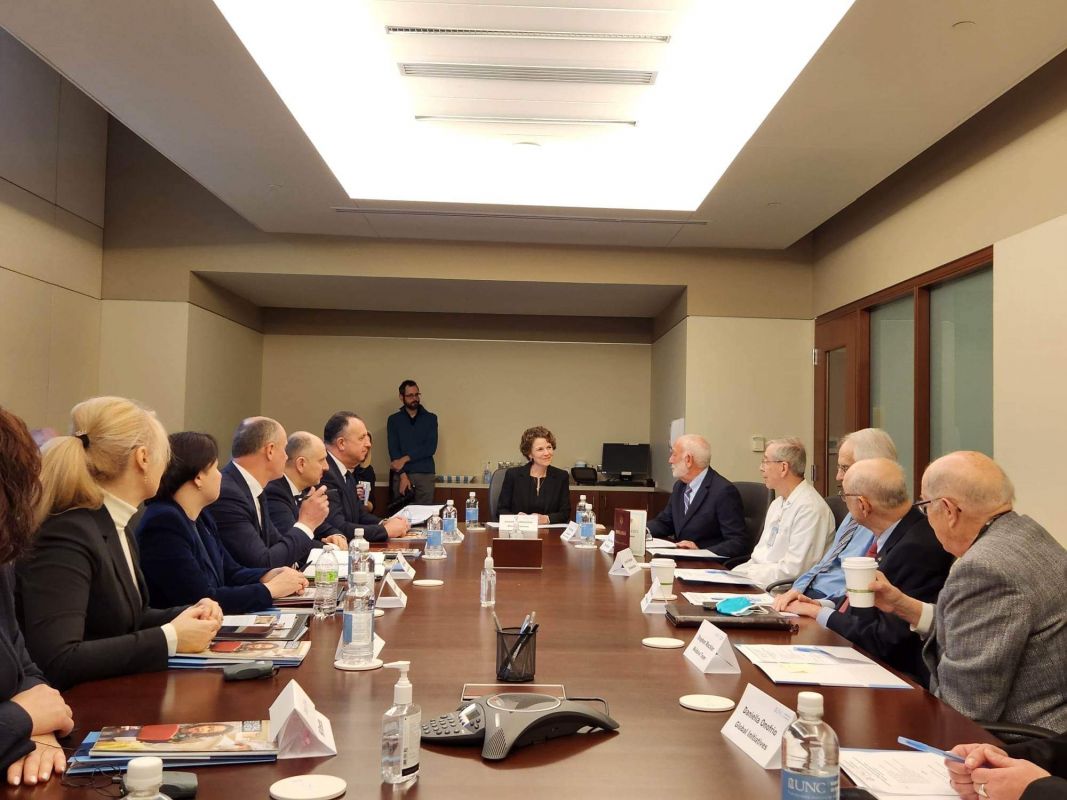
I met with Dean Dr. Janet Guthmiller and other representatives of the Adams School of Dentistry. We discussed the results of the partnership and the prospects for future cooperation in this field, the organization of academic mobility for students and teachers. We also tackled the possibilities of training dentists for the state of North Carolina. At the same time, I visited the Phonology Laboratory and the Craniofacial Research Center, where craniofacial, oral-maxillo-facial, tissue restoration, plastic and aesthetic surgeries are performed. It is a well-equipped private center working with professors from our university. This fact allows an interdisciplinary approach to complex problems in both children and adults. The visit to the Adams School of Dentistry allowed us to identify new opportunities for cooperation in the field of training future dentists, as well as the requirements for setting up simulation laboratories and university dental clinics.
Have you also visited the UNC School of Nursing in Greensboro?
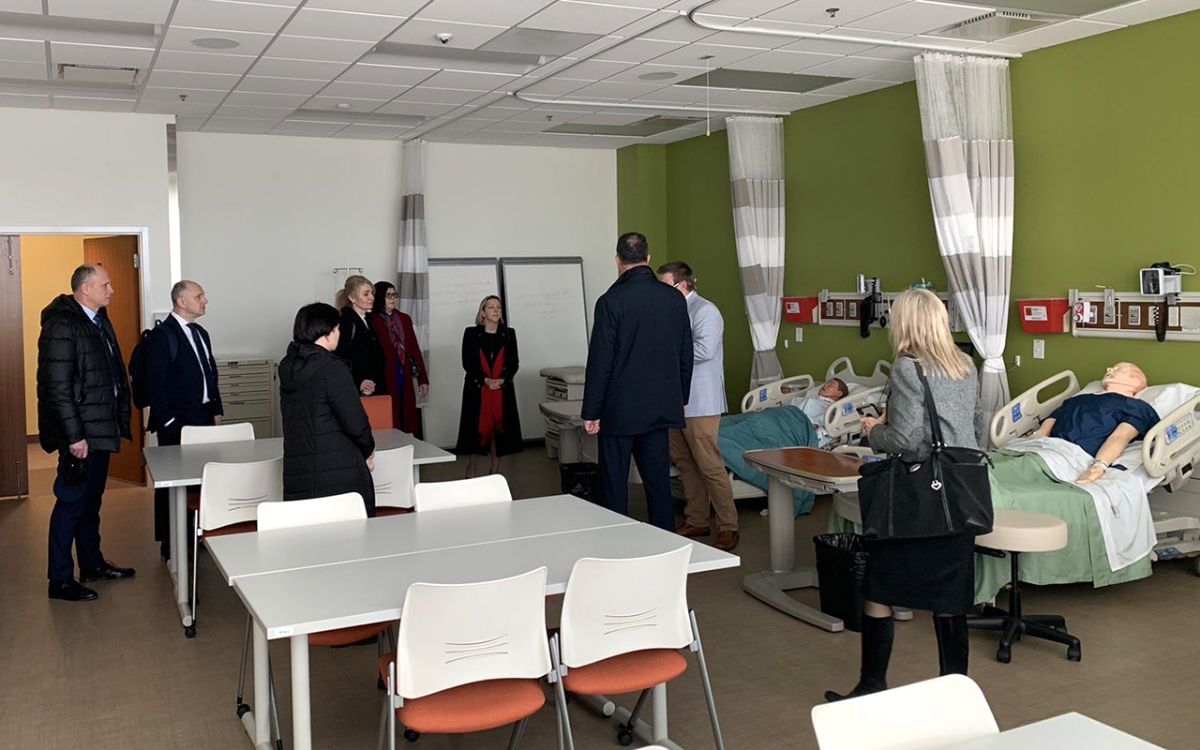
At the University of North Carolina in Greensboro I approached the components of the Nursing and Nutrition undergraduate program. We visited two nurse training centers – in a state hospital and in a private entity, where we learned about the differentiated study programs. Nursing is highly developed in the US. Nurses have great authority in the medical system and strong organizations that defend their rights and interests, they practically compete with doctors, having much greater responsibilities than in our country. Nurses also perform resuscitation, anesthesia, doctors can only give some indications. Nurses are trained for the American health system, through two, three and four-year study programs, for various medical fields: management, IT, phlebotomy, anesthesiology, cardiology, etc. Afterwards, they can continue their studies through master's and doctoral programs.
Here we had the opportunity to visit several nursing simulation centers, equipped with high-fidelity simulators and high-performance models, including for continuing professional training. The Bachelor's program in General Nursing and the Professional Master's program in Advanced Nursing were analyzed. The study objectives and curriculum were compared with those developed by the US counterparts. This year we expect to launch at our university a new advanced Nursing master's program with the aim of training teaching staff for study programs in the field of General Nursing. In addition, we want to create a chair or a clinical base, within the Timofei Moșneaga Republican Clinical Hospital, which would serve as a training center for nurses according to the American model.
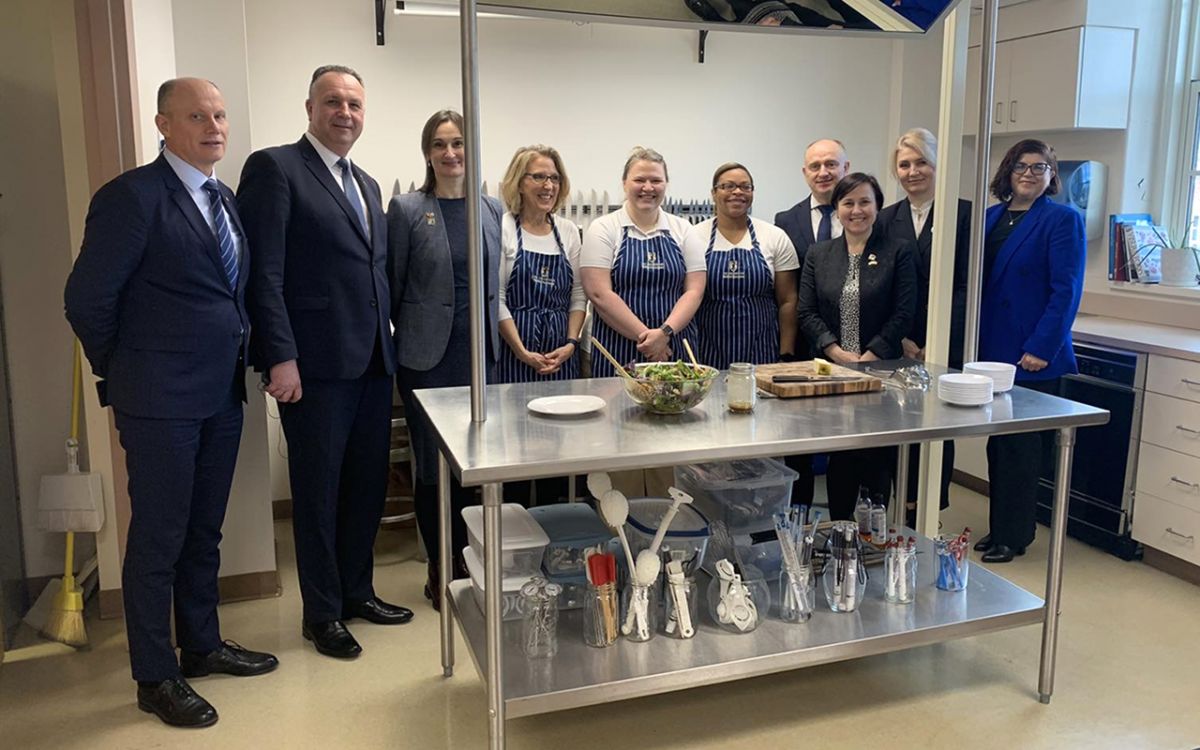 Moreover, I had a meeting with representatives of the Nutrition undergraduate program and identified several aspects of collaboration to carry out an academic exchange of students, as well as for equipping a Nutrition Laboratory. I also attended some lectures in the field. In every state and private clinic there is a nutritionist who draws up individual nutrition plans and develops behavior patterns for each patient. We also visited a food menu preparation center. As a result of the dialogue, the idea of establishing a mechanism for issuing a double degree for the master's program in Nutrition, for a master's student or teaching staff of our university, was launched, a project that can be realized through a Rotary study grant.
Moreover, I had a meeting with representatives of the Nutrition undergraduate program and identified several aspects of collaboration to carry out an academic exchange of students, as well as for equipping a Nutrition Laboratory. I also attended some lectures in the field. In every state and private clinic there is a nutritionist who draws up individual nutrition plans and develops behavior patterns for each patient. We also visited a food menu preparation center. As a result of the dialogue, the idea of establishing a mechanism for issuing a double degree for the master's program in Nutrition, for a master's student or teaching staff of our university, was launched, a project that can be realized through a Rotary study grant.
We know that, over the years, several Rotary clubs in the USA have offered financial, humanitarian, and logistical support to the Republic of Moldova and our university in implementing partnerships. Thus, your agenda also included a meeting with the members of this organization.
Yes, we met with members of the Rotary Club in the city of Greensboro, represented by Dr. Stephen Mackler, whom we thanked for their assistance and logistical support in the realization of the Moldovan-American partnership, including their contribution to the organization of our trip to North Carolina. This meeting was attended online by several Rotary members from Chisinau, involved in the development of the Republic of Moldova - North Carolina partnership, including by Mrs. Irina Rusanovschi, the president of Phoenix NGO.
The visit to the University of California School of Dentistry was undertaken in the context of the expansion of accreditation of our university's School of Dentistry by the Dental Board of California?
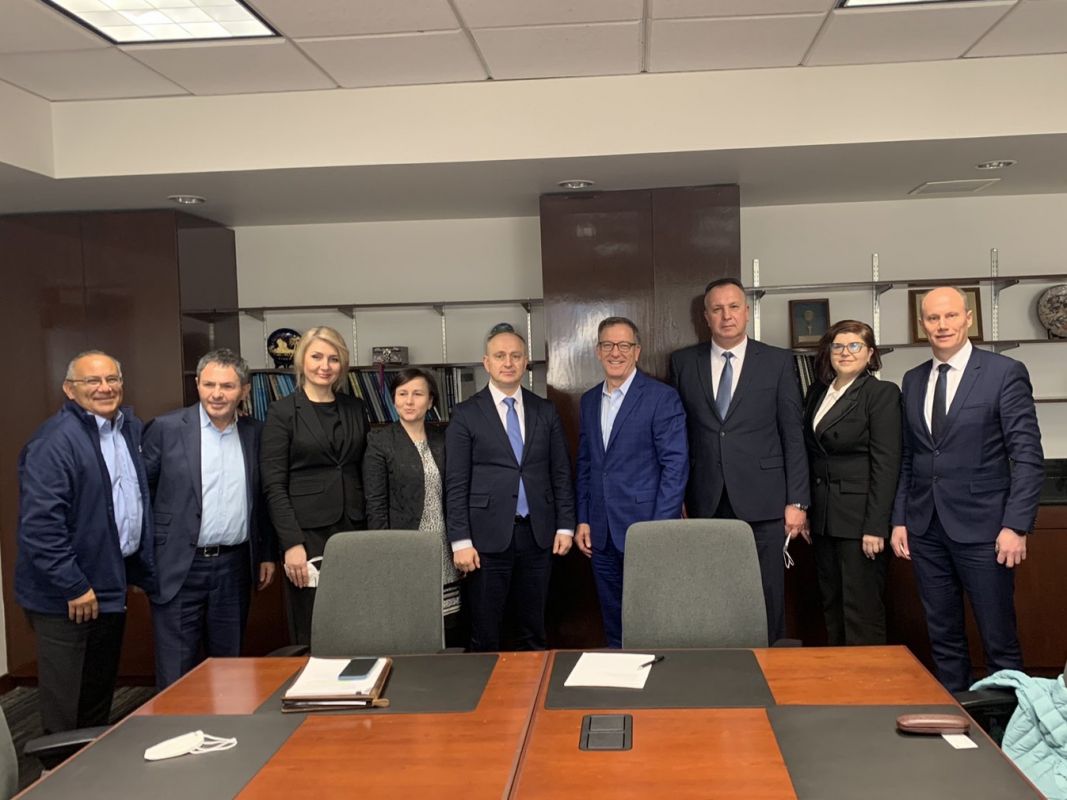
This was one of the priority objectives of our visit to the USA. After completing the program in North Carolina, I visited the University of California, Los Angeles. There we met with the dean of the School of Dentistry, we visited the University Dental Clinic, we identified opportunities for collaboration in terms of academic mobility of teaching staff, as well as the design of educational spaces. We also visited a state dental clinic whose director is a graduate of our university. The people I talked to heard about our university, about the high level of training of dentists. We were informed that 98% of the graduates of the Dentistry Clinical Fellowship program (International Dental Program) of Nicolae Testemitanu University successfully passed the exam in California, a fact that is highly appreciated. In this context, the Senate of California awarded a degree, not to me personally, but to the University, to members of the Faculty of Dentistry, for outstanding results in the training of American dentists. We are currently working intensively in this direction, to expand the accreditation of the Dentistry program.
It is known that the Open World program envisages cultural exchange provided that the beneficiaries are accommodated in families. Tell us how you felt.
During this entire period, we were accommodated in American families, and every two days we used to gather with the whole team and the host families at one of these families’ places. The people were very open and hospitable. Most visited the Republic of Moldova, had positive opinions of our country, and expressed their desire to return. In each family I saw things and photographs from the Republic of Moldova. Overall, it was a very interesting and diverse intercultural exchange.
What impressed you the most in the US?
To be honest, I went to the United States with one vision and came back with a completely different one. In fact, there I saw what democracy means, to have a prestigious job and a decent living. I was impressed by the infrastructure, the architectural policies of the cities. For example, in the state of North Carolina the law stipulates that buildings must not exceed the width of the street and have no more than two stories. All houses are built from ecological wood and are insured. In case of calamities, the state bears all costs. North Carolina is green and beautiful, people live in wooded areas, at long distances from work.
In Los Angeles - a city with an official population of 4 million, and of 6 million together with the suburbs, unofficially, when you walk down the street you see no one. Everyone is working... I was struck by the road infrastructure, irrespective of the number of transport units, there are no traffic jams. It's a different higher civilization level …
Dear Mr. Rector, Thank you for this interview!
Preluarea informației de pe site-ul USMF „Nicolae Testemițanu” poate fi efectuată doar cu indicarea obligatorie a sursei și a linkului direct accesat pe www.usmf.md.

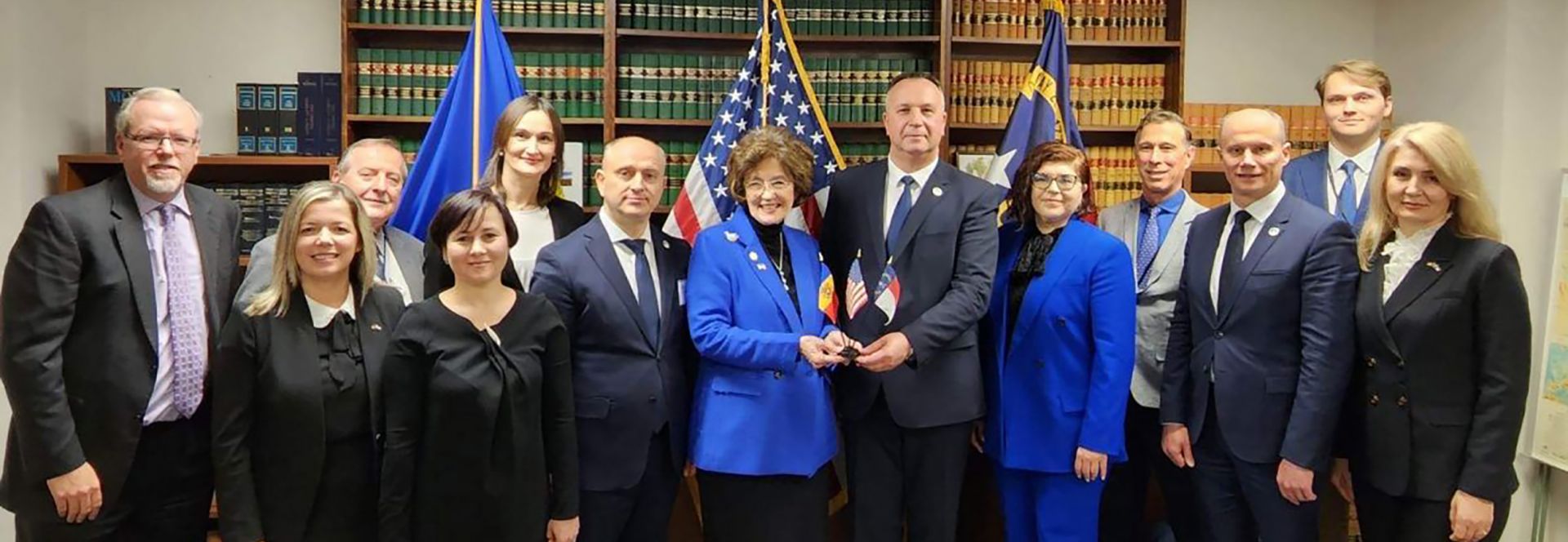
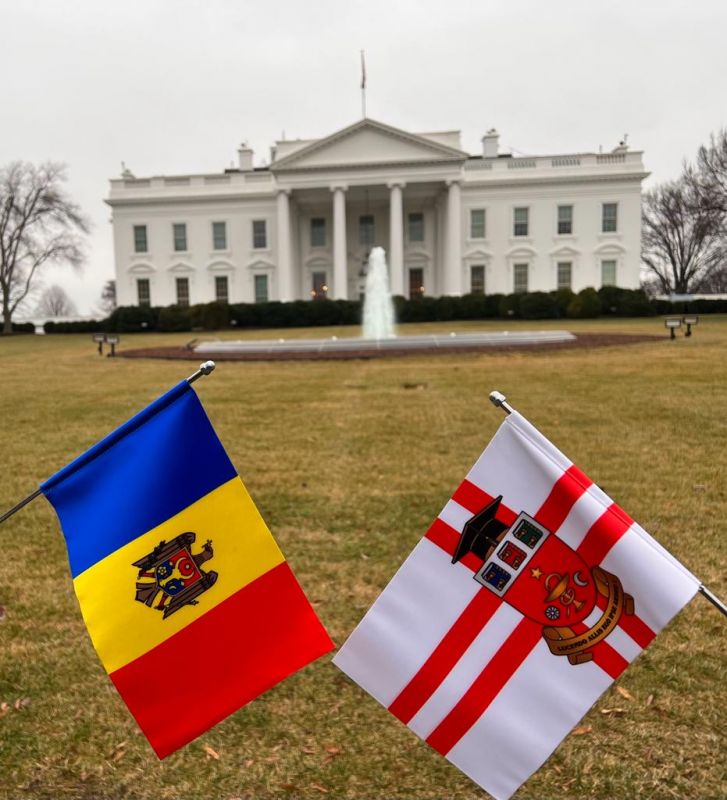

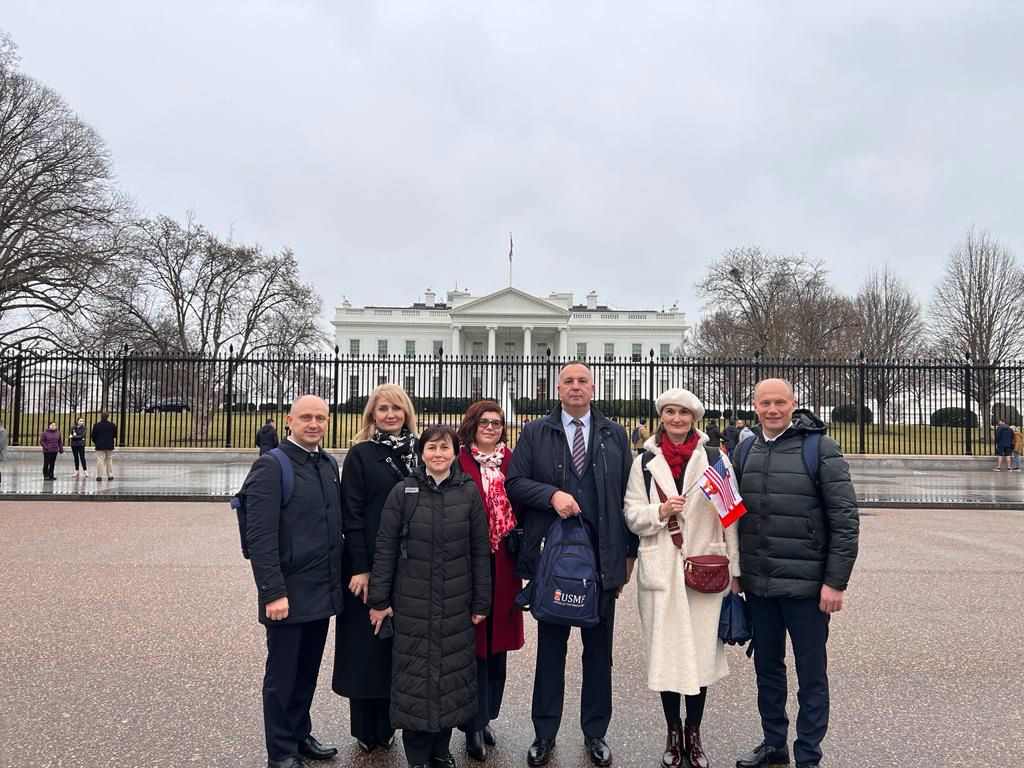
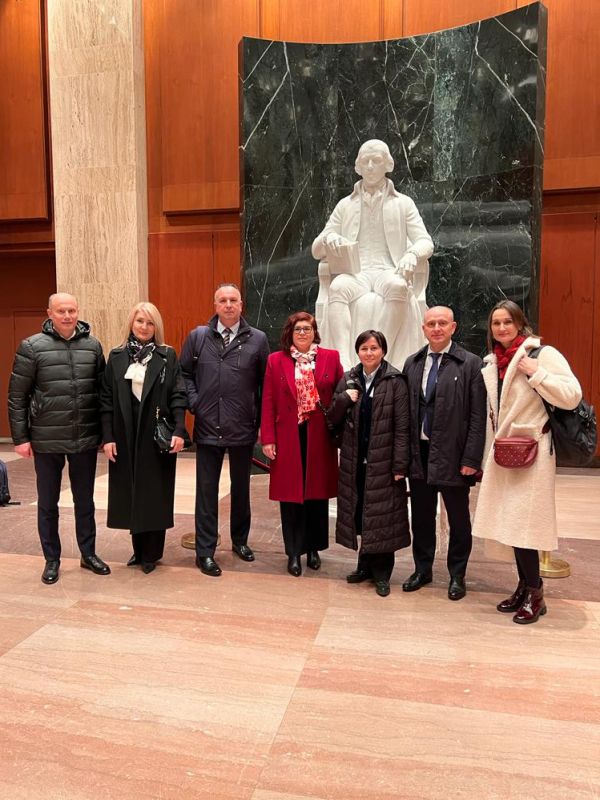
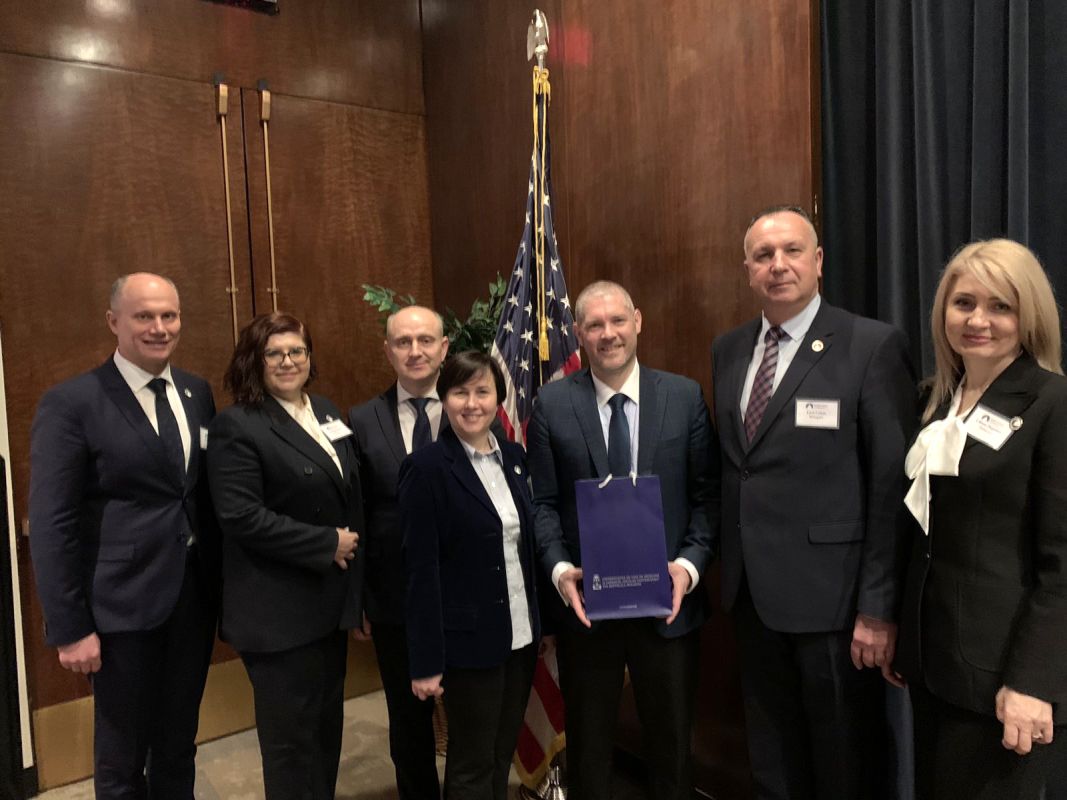
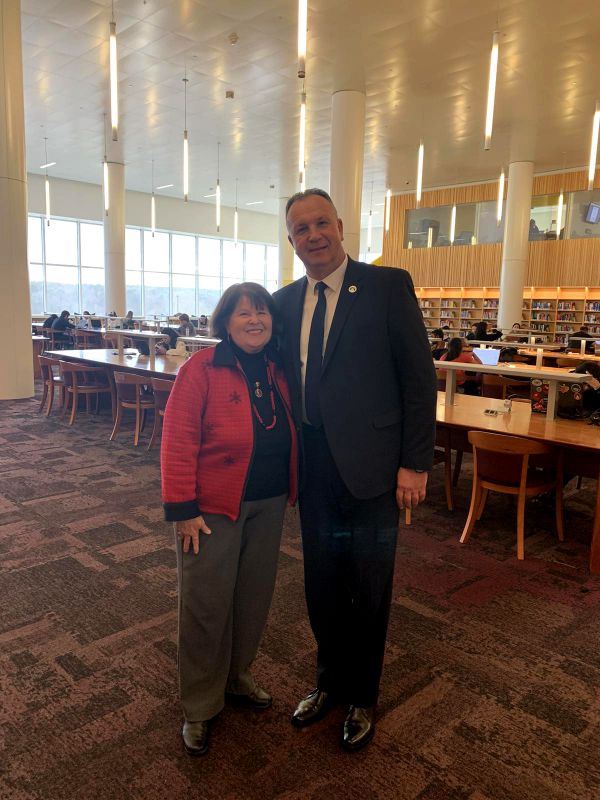
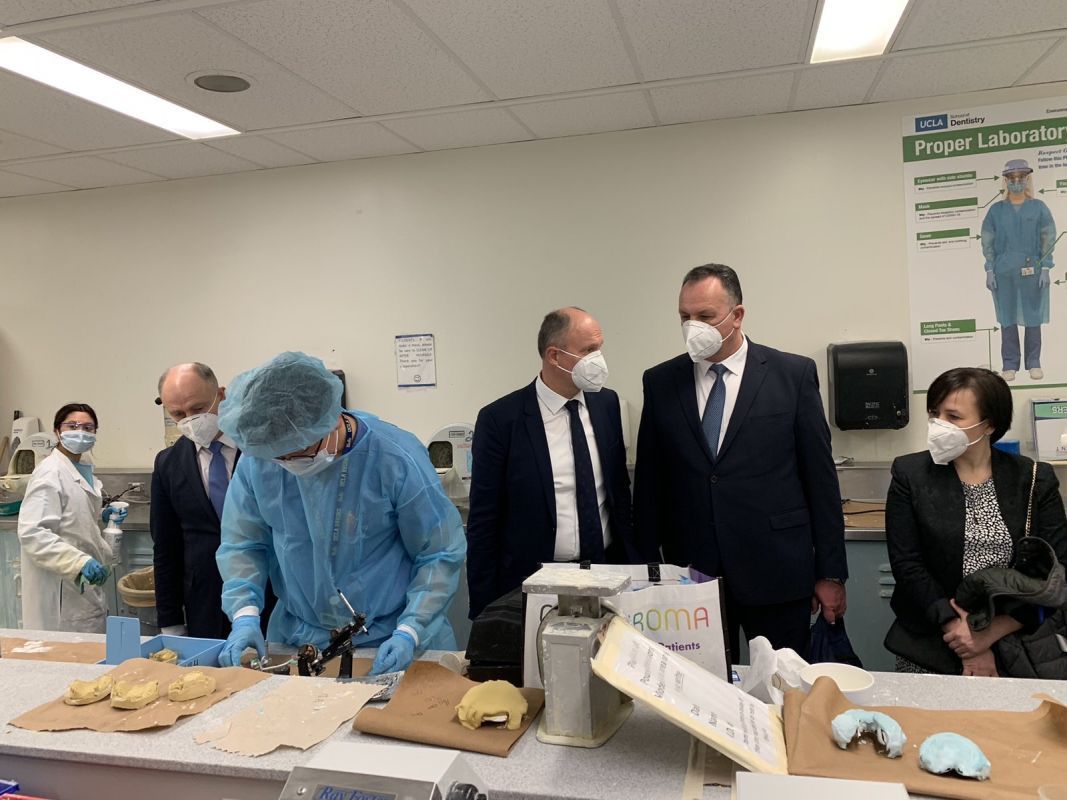
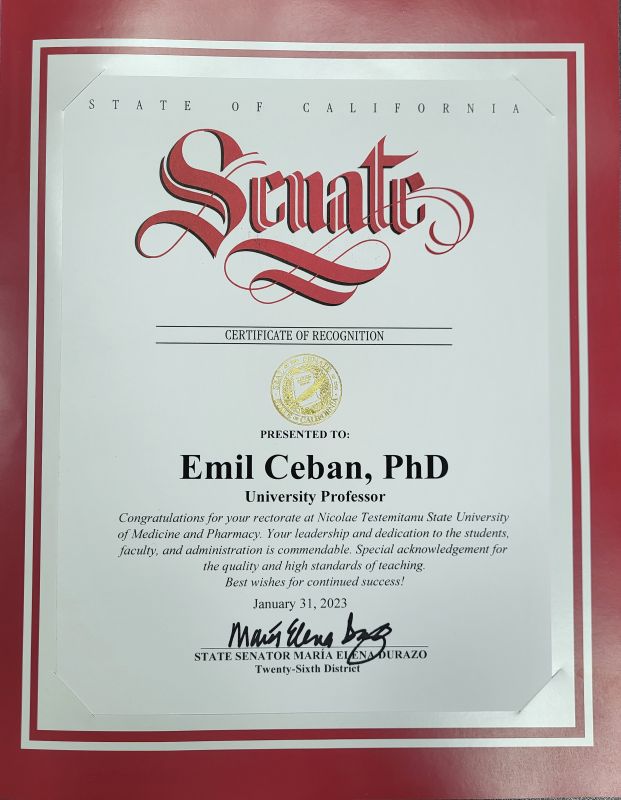
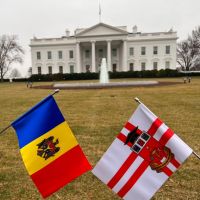
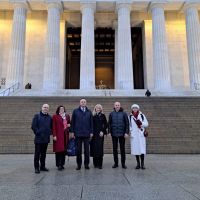
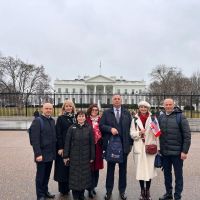
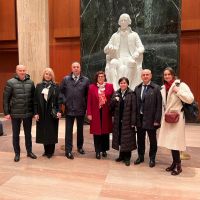
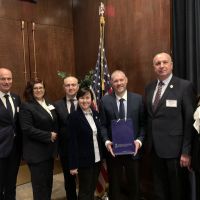
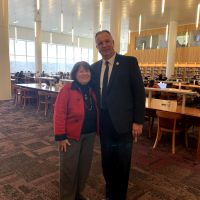
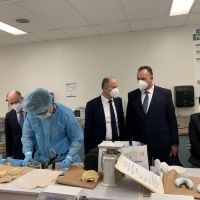
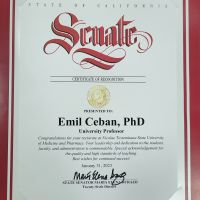
Comentarii